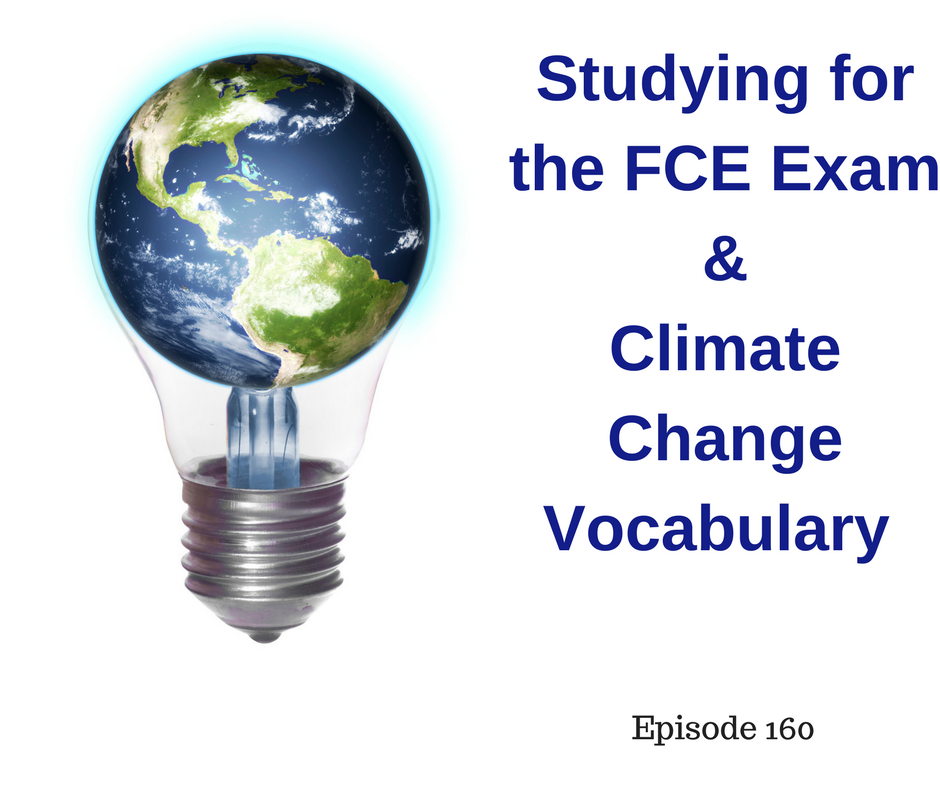
Are you studying for the Cambridge FCE exam? Need some help? We’ll be talking about that and climate change vocabulary on this week’s episode of……Aprender Inglés con Reza y Craig
Voice message from Andres and Lulu who are living in Yorkshire, UK
We spoke about the pronunciation of irregular verbs in episode 73
We also spoke about the ‘ed’ endings on regular verbs in episode 60
XWe are living in Yorkshire since one year ago.X – We’ve been living in Yorkshire for a year. We came to Yorkshire a year ago.
Email from Alberto Diaz
Hello Craig and also Reza “The dynamic duo” hahaha
Please help me, I have a doubt
How we can realize what “time” has the verb could in the next sentence? (How can we know which tense the verb ‘could’ is in the next sentence?):
“I could go to the party.”
Past: Pude/Podía ir a la fiesta
Subjuntivo: Podría ir a la fiesta.
How (does) a native speaker figure out the exact tense (past or subjunctive)?
Thanks in advance, Alberto.
I could go to the party – It’s a possibility – Conditional – If I had a car, I could go to the party (but I don’t have a car, so I can’t)
Past ability – I could go to the (firm’s Christmas) party before I became an alcoholic (I was able to)
If I could (PAST-pudiera) run faster, maybe I could (CONDITIONAL-podría) be a famous athlete some day.

Improve your speaking with an italki teacher
Voice message from Sira from Sabadell
I live near Barcelona (or ‘next to’)
I’m enjoying the podcast (or ‘I’m enjoying IT’)
XThank you for allX – Thank you for everything
We already looked at some useful vocabulary about The Environment in Episode 96
Climate Change Vocabulary 
Climate change – change in global weather patterns
Emissions – gasses and smoke from power stations and factories burning coal and from car exhaust fumes (carbon dioxide).
Greenhouse gases – gases that allow the sun’s radiation to pass through the earth’s atmosphere. They also trap heat and stop it leaving the atmosphere (carbon dioxide, methane, nitrous oxide)
The greenhouse effect – the effect that greenhouse gases have on the environment
Fossil fuels – gas, oil, coal etc
Ecosystems – natural habitats that support different kinds of animal and plant life, such as coral reefs.
Carbon footprint – The measure of greenhouse gas emitted by certain actions of humans or industries.
Extreme weather – flooding, typhoons/hurricanes, tornados, etc.
Flash flooding – very severe flooding which happens extremely quickly
Desertification
Deforestation
Rising sea levels
Rising ice caps
Food/Water shortages
Drought
Illegal logging – cutting down trees illegally
Heatwaves – periods of unusually hot weather
Climate change denier – person who denies/rejects the existence of climate change
The polar ice cap is melting
Floods, droughts and other extreme weather conditions lead to food shortages
The ozone layer protecting the Earth’s atmosphere is being damaged
Useful Expressions
As a result of….
Has an impact on…
Is a consequence of…
A rise in temperature could lead to…..
There’s a high risk of…
Long-term consequences
Voice message from Mamen (Thank you for the cheese!)
Flo-Joe Cambridge exam practice: http://www.flo-joe.com/
Cambridge exam listening practice: http://www.examenglish.com/FCE/fce_listening.html
Cambridge exams information: http://www.cambridgeenglish.org/exams/first/ – You can change the language to Spanish at the top right hand side of the page (on a desktop)
La Mansión del Inglés First Certificate Course
Get Spoken app: http://www.getspokenapp.com/
…and now it’s your turn to practise your English. Do you have a question for us or an idea for a future episode?
Send us a voice message and tell us what you think. https://www.speakpipe.com/inglespodcast
Send us an email with a comment or question to [email protected] or [email protected].
If you would like more detailed show notes, go to https://www.patreon.com/inglespodcast
Our lovely sponsors are:
Nikolay Dimitrov
Ana Cherta
Pedro Martinez
Manuel García Betegón
Maite Palacín Pérez
Lara Arlem
Maria Gervatti
Sara Jarabo
Carlos Garrido
Zara Heath Picazo
Mamen
Juan Leyva Galera
Corey Fineran
Mariel Riedemann
Jorge Jiménez
Raul Lopez
Rafael
Manuel Tarazona
Agus Paolucci
Manuel Velázquez
Néstor García Mañes
Juan Carlos
We want to thank Arminda from Madrid and Alberto from Granada for continuing to transcribe full transcriptions.
Alberto has transcribed episodes 132 and 133, so we now have full transcriptions for episodes 131 to 142.
On next week’s episode: Personal Space
The music in this podcast is by Pitx. The track is called ‘See You Later’


Hi, after listening to the podcast I´d like to make a clarification to Alberto about the sentence “I could go to the party”. This sentence is never subjunctive in Spanish, it could be simple past or conditional. The translation is: Podía o pude ir a la fiesta (simple past), o podría ir a la fiesta (conditional). Subjuntive would be: Ojalá pueda ir a la fiesta.
You use subjunctivo in case of hypothetical or unreal sentences or in case of expressing a wish.
Cheerio
Marian
Hello Reza and Craig, I’m writing as I listen to you and I was wondering, Is it ok to say:
If I could (si pudiera) go to the party I wolud (lo haría).
Or
I could (podría ir) go to the party if I would (si quisiera???)
Is it needed to say “I colud go to the party if I would MIND IT/CARE ABOUT (IT)/LIKE” (adding a subject)
Hope you understand what I’m trying to ask…
Lucía
Hi Lucia. Yes, I do understand your question and we’ll answer it in a future podcast. Keep listening!